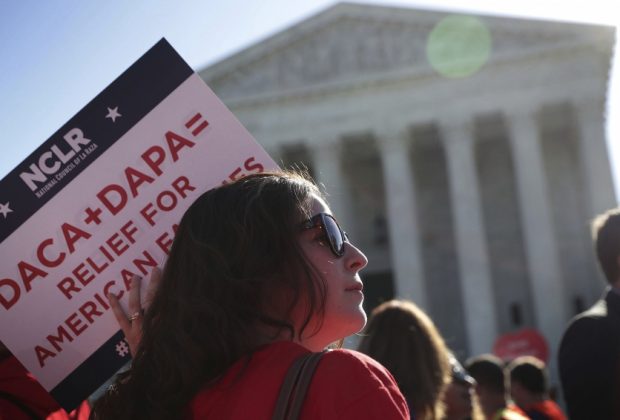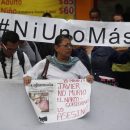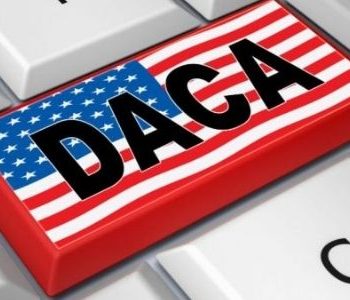June 16, 2017
The Trump administration’s decision this week not to immediately end a program that lets young undocumented immigrants remain in the United States on two-year renewable terms was cautiously welcomed by so-called Dreamers who still worry about their long-term status.
The Department of Homeland Security released the decision on Thursday, the fifth anniversary of the Deferred Action for Childhood Arrivals program.
DACA recipients "will continue to be eligible" to renew their status every two years, and "no work permits will be terminated prior to their current expiration dates," according to a fact sheet posted on the department’s website.
The program’s long-term outlook, though, is unclear, with some news reports suggesting the administration continues to give mixed signals about its fate.
About 800,000 people have benefited from DACA, which allows certain young people who were brought to the United States illegally as children to get driver’s licenses, Social Security cards, and more-affordable access to college.
Jose Rivas, a 27-year-old graduate student in counseling at the University of Wyoming who has DACA protections, said the announcement was a "huge relief" because he plans to leave on a monthlong educational trip to Mexico in late July with the California-Mexico Dreamers Study Abroad Program.
Dreamers can study abroad and return lawfully if they receive "advance parole" from the United States Citizenship and Immigration Services. But if DACA is ended, the status that allows them back into the United States might expire as well, immigration experts have warned.
"I was worried that President Trump was going to drop DACA while I was in Mexico and that I might not be able to return," Mr. Rivas said.
While he’s relieved about DACA, he wishes his parents, both undocumented immigrants, could have that peace of mind too.
But Thursday’s decision said that another Obama-era program, the Deferred Action for Parents of Americans, will be formally ended. That program, known as DAPA, would have allowed immigrant parents of U.S. citizens, as well as permanent-resident children, to remain in the United States for the time being. But it was blocked in the courts before it was carried out.
‘Some Grounds for Relief’
The decision to continue DACA, at least for now, will alleviate much of the uncertainty afflicting Dreamers about their status, said Michael A. Olivas, a professor at the University of Houston and national expert on immigration law and higher-education law.
But he said it was still a stopgap measure that offered them no path to legal permanent residence. That, Mr. Olivas said, will require comprehensive immigration reform.
"DACA has always been a modest though generous holding ground for these students, who are still at risk and who still have no pathway to become legal permanent residents," he said.
By continuing DACA and dropping DAPA, "we will have intrafamily gaps that are even more pronounced," as more young people are protected and their parents and siblings more at risk of deportation, Mr. Olivas said.
"The bottom line for me is that it does preserve DACA, and I hope students will continue applying or reapplying," and not just protesting in the streets, which, he said, makes them and their families more vulnerable to deportation.
Thomas A. Saenz, president and general counsel of the Mexican American Legal Defense and Educational Fund, said there were "some grounds for relief" in light of the announcement, "but because of the unpredictability of this administration, we have to continue to be vigilant."
"This administration is trying to create as much fear and confusion as possible among the immigrant community with the hopes that they will voluntarily leave," he said.
Cesar Vargas, a spokesman for the Dream Action Coalition and one of New York State’s first undocumented students to become a lawyer, said he planned to continue fighting for parents and siblings who don’t have DACA protections.
Other critics raised doubts about the administration’s latest announcements.
"I still have questions about what it really means that the program is continuing, when we’re still hearing about individuals with DACA who are being deported or detained," said Kamal Essaheb, policy and advocacy director at the National Immigration Law Center. "We’re also alarmed by the broader effort by the administration to deport as many people as possible."
Other people took to Twitter to share similar concerns.
#DACA recipients are being framed, stalked, deported, and even having their protection taken away because of a parking ticket. #HereToStay
— AAJC (@AAAJ_AAJC) June 15, 2017
While welcomed by undocumented students, the president’s decision to continue DACA was unpopular with groups, like the Federation for American Immigration Reform, that favor tougher immigration restrictions.
FAIR applauds end of DAPA. Trump must terminate DACA as well - both are "an illegal executive overreach."
— FAIR (@FAIRImmigration) June 16, 2017
The Association of Community College Trustees also welcomed the news, saying DACA has provided "stability and economic opportunity" to students who attend open-access institutions.
Katherine Mangan writes about community colleges, completion efforts, and job training, as well as other topics in daily news. Follow her on Twitter @KatherineMangan, or email her at katherine.mangan@chronicle.com.







